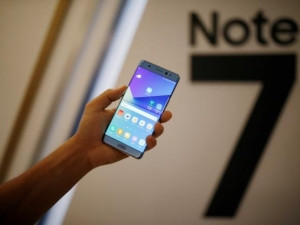
Greenpeace interrupted the Samsung event at Mobile World Congress, in Barcelona this week, demanding to know how the company planned to dispose of the millions of recalled Note 7s.
Last year, Samsung's flagship phablet device, the Galaxy Note 7, had to be recalled and eventually cancelled after a fault in battery design led to the smartphones catching fire.
Greenpeace says electronic waste (e-waste) is harmful to the planet, and if the tech giant gets rid of the recalled devices in a sustainable way, it could pave the way and allow other companies to follow suit.
"What has happened with Samsung's recall of the Galaxy Note 7 is indicative of a wasteful and unsustainable system. Rushed design and production cycles can lead to wasteful mistakes, not to mention the impact on our planet," says Jude Lee, global senior campaigner at Greenpeace East Asia.
"Samsung still hasn't shared a clear plan to deal with the 4.3 million phones that it recalled. If Samsung is serious about making sure this never happens again, it must lead the IT sector and move towards a system that allows phones to be more easily repaired, reused and recycled."
In a statement released by the environmental group, it detailed how smartphone production and disposal over the past decade is having a significant effect on the planet.
It said around 968 terawatt-hours have been used to manufacture smartphones since 2007, which is nearly the equivalent of one year's power supply for India, and the devices contribute significantly to the 50 million metric tonnes of e-waste expected to be generated this year.
E-waste is a problem because the electronics include toxic chemicals, like arsenic and lead, which mostly end up in landfills where the chemicals contaminate the soil and water.
The activists are demanding Samsung reuse and recycle the 4.3 million Galaxy Note 7's recalled last year.
"If all the smartphones produced in the last decade were still functional, there would be roughly enough for every person on the planet. Consumers are pushed to upgrade their models so frequently that the average device is used for just over two years. The impacts on the planet are devastating," says Elizabeth Jardim, senior corporate campaigner at Greenpeace USA.
"When you consider all of the materials and energy required to make these devices, their short lifespans, and the low rate of recycling, it's clear we can't continue this way. We need devices that last longer and ultimately, we need companies to embrace a new, circular production model."
Samsung has yet to issue a statement on how it will deal with the smartphones.
The company was meant to launch its next flagship device, the Samsung Galaxy S8, at the show, but this was pushed out to make sure all battery issues are resolved.
It did, however, launch the 9.7-inch Galaxy Tab S3, which features a Qualcomm Snapdragon 820 chip, 4GB RAM, 32GB storage and a quad-speaker set created by AKG.
Samsung confirmed the official launch of the S8 will take place on 29 March.
Share